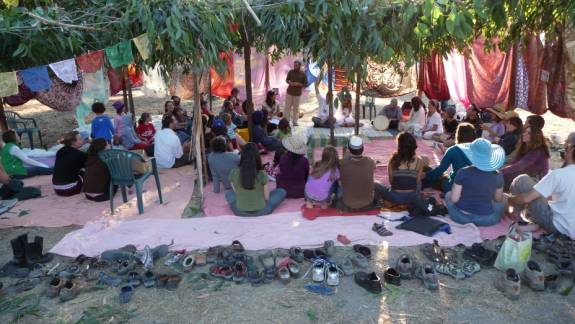The Festival of Sukkot allows us to take a step back, to appreciate the material possessions that God has given us and to understand how to use them for spiritual means.
By: Rabbi Ari Enkin, Rabbinic Director, United with Israel
As we have discussed before in this column, each of the three Festivals – Pesach (Passover), Shavuot (Pentecost) and Sukkot (Tabernacles) – correspond to the three patriarchs, Abraham, Isaac, and Jacob.
Passover corresponds to Abraham in recognition of the fact that he was visited by three angels on Passover. He fed the angels matzot (unleavened bread). Shavuot corresponds to Isaac, to recall the shofar (ram’s horn) that was blown when the Torah was given on Mount Sinai on that first Shavuot.
We are told that the shofar was made from the ram that was sacrificed in place of Isaac, an episode known as the Akeida. Sukkot corresponds to Jacob based on the verse that upon Jacob’s return to the land of Israel, “he built for himself a house, and for his cattle he made sukkot (huts).”
The commentators all grapple with the seemingly weak connection between Jacob and the holiday of Sukkot. What is so special about the fact that Jacob built huts for his cattle to make the holiday permanently associated with him?
Among the many answers given is that the connection between Jacob and Sukkot originates in the confrontation that the patriarch Jacob had with a mysterious man or, according to some accounts, an angel that had ambushed him when he was alone.
Why was Jacob alone? Where was his family?
Material Wealth Can Lead to Spirituality
The Torah tells us that Jacob had forgotten some “small jugs” on the other side of the river and went back to get them. It seems odd that Jacob left his family and went back to fetch these jugs, whose value was minimal.
The Talmud teaches that we see from here that a truly righteous person is one who values even his material possessions.
Why is this? Why do the righteous –those who seemingly focus on the spiritual rather than material—care so much about their material possession?
The answer is that righteous people work hard in order to purchase and acquire their material possessions; they avoid even the smallest hint of theft or dishonesty.
The righteous truly realize and appreciate that it is God who gives them all their possessions. As such, by returning for the “small jugs” Jacob realized that he was returning for God-given gifts. Who wouldn’t make the effort to retrieve such gifts? As such, Jacob made extra effort to retrieve his possessions, even in the danger of darkness.
We see from here that material wealth and possession can be a conduit for Godliness and spirituality. One who views wealth and worldly possessions as an end unto itself would not care about “small jugs” and would just get some new ones. A righteous person like Jacob, however, understands that whatever a person has is because God wants him to have it.
Perhaps this sheds light on the connection between Jacob and the holiday of Sukkot. Jacob built sukkot for his cattle (material possessions). On the festival of Sukkot, we leave our homes to dwell in temporary huts. The sukkah (hut) teaches us that life is transient and flimsy.
It reminds us that all our material possessions are only a means to serve God. Our homes should be filled with guests, our money shared with the poor, and our cars for helping others with acts of kindness. Sukkot allows us to take a step back, to appreciate the material possessions that God gave us and recommit to using them for spiritual means.

Do You Love Israel? Make a Donation to Show Your Support!
Donate to vital charities that protect Israelis and help inspire millions around the world to support Israel too!
Now more than ever, Israel needs your help to fight and win the war -- and also the battle of public opinion.
Anti-Israel bias and boycotts are out of control. Israel's enemies effectively use social media to incite brutal terror against innocent Israeli civilians. Please help us fight back!




